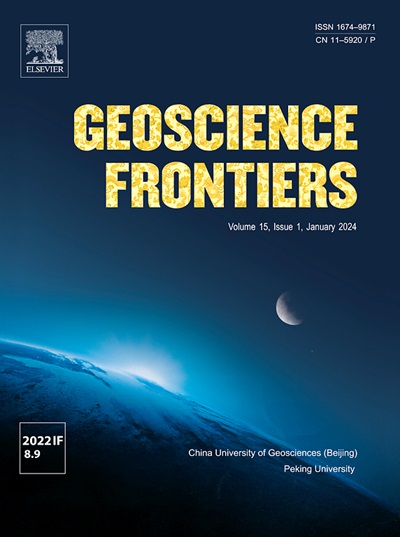Promoting green taxation and sustainable energy transition for low-carbon development
IF 8.9
1区 地球科学
Q1 GEOSCIENCES, MULTIDISCIPLINARY
引用次数: 0
Abstract
Since there is a scientific consensus that the energy sector has brought the planet to the tipping point of climate change, transitioning to sustainable energy sources is inevitable to halt foreseeable climatic adversities. This study looks at how promoting green taxation and sustainable energy transition affected the G7 nations’ goal of low-carbon development between 1994 and 2020. This study used Generalized Least Squares Random Effects Regression and Driscoll-Kraay Standard Errors-based Least Sqaures approaches for empirical analysis. The latter approach accounts for cross-sectional dependence, heteroscedasticity, and autocorrelation to provide robust empirical outcomes. The empirical results are as follows: Firstly, through lowering CO2 intensity and greenhouse gas emissions, the environmental tax revenues have enhanced the condition of the environment. The total tax revenues linked to the environment had a greater overall impact than the tax revenues related to the energy industry. Furthermore, compared to CO2 intensity, both of the environmental tax revenue factors contributed considerably more to greenhouse gas emissions. Second, the sustainable energy transition helped to lower greenhouse gas and CO2 intensity. Among covariates, international trade was supportive of low-carbon development, but industrialization and GDP per capita did the opposite. The panel bootstrap causality revealed a unidirectional causal connection from all independent variables, except foreign direct investment, to CO2 intensity and greenhouse gas emissions. These results demonstrated that the G7 nations’ environmental policies supported their commitment to achieving low-carbon development goals. In this respect, the G7 nations’ environmental emission reduction efforts benefited more from the overall environmental tax revenues. To secure the industrial emissions reduction for a future with net-zero carbon emissions, it is thus advised to continue using policies that price environmental emissions, such as the carbon taxation regulations. Additionally, plans for the sustainable energy transition that includes a quick rise in renewable energy sources in the overall energy mix are successful in lowering environmental emissions. For environmental sustainability and low-carbon development, it is thus advised to divert the taxation burden from renewable energy technologies to the fossil fuel industry to enhance the sustainable energy transition phenomenon for achieving Sustainable Development Goals (especially SDG-7 and SDG-13).

推动绿色税收和可持续能源转型,促进低碳发展
由于科学界已达成共识,即能源行业已将地球带入气候变化的临界点,因此,为阻止可预见的气候逆境,向可持续能源过渡势在必行。本研究探讨了 1994 年至 2020 年间,促进绿色税收和可持续能源转型如何影响七国集团的低碳发展目标。本研究采用广义最小二乘法随机效应回归法和基于标准误差的最小二乘法进行实证分析。后一种方法考虑了横截面依赖性、异方差和自相关性,以提供稳健的实证结果。实证结果如下:首先,通过降低二氧化碳强度和温室气体排放,环境税收改善了环境状况。与环境相关的税收总收入的总体影响大于与能源产业相关的税收收入。此外,与二氧化碳排放强度相比,环境税收因素对温室气体排放的影响要大得多。其次,可持续能源转型有助于降低温室气体和二氧化碳强度。在协变量中,国际贸易支持低碳发展,但工业化和人均国内生产总值则相反。面板自举因果关系显示,除外国直接投资外,所有自变量与二氧化碳强度和温室气体排放之间都存在单向因果关系。这些结果表明,G7 国家的环境政策支持其实现低碳发展目标的承诺。在这方面,G7 国家的环境减排努力从整体环境税收中获益更多。因此,为了确保未来实现碳净零排放的工业减排目标,建议继续使用环境排放定价政策,如碳税法规。此外,可持续能源转型计划,包括在整个能源结构中迅速增加可再生能源,也能成功降低环境排放。因此,为了环境的可持续发展和低碳发展,建议将可再生能源技术的税收负担转移到化石燃料行业,以加强可持续能源转型现象,从而实现可持续发展目标(尤其是可持续发展目标 7 和可持续发展目标 13)。
本文章由计算机程序翻译,如有差异,请以英文原文为准。
求助全文
约1分钟内获得全文
求助全文
来源期刊

Geoscience frontiers
Earth and Planetary Sciences-General Earth and Planetary Sciences
CiteScore
17.80
自引率
3.40%
发文量
147
审稿时长
35 days
期刊介绍:
Geoscience Frontiers (GSF) is the Journal of China University of Geosciences (Beijing) and Peking University. It publishes peer-reviewed research articles and reviews in interdisciplinary fields of Earth and Planetary Sciences. GSF covers various research areas including petrology and geochemistry, lithospheric architecture and mantle dynamics, global tectonics, economic geology and fuel exploration, geophysics, stratigraphy and paleontology, environmental and engineering geology, astrogeology, and the nexus of resources-energy-emissions-climate under Sustainable Development Goals. The journal aims to bridge innovative, provocative, and challenging concepts and models in these fields, providing insights on correlations and evolution.
 求助内容:
求助内容: 应助结果提醒方式:
应助结果提醒方式:


